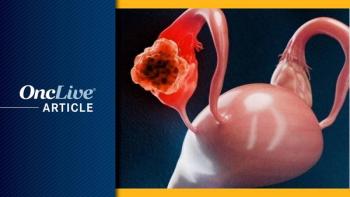
Recurrent Ovarian Cancer: Novel Agents Under Investigation
Bradley J. Monk, MD: That’s a great summary. There are 6 indications of PARP inhibitors in recurrent disease: 3 for treatment and 3 for platinum-sensitive maintenance. There are 2 indications of bevacizumab: platinum-resistant and platinum-sensitive disease. And although there’s only 5 chemotherapy approved backbones, there’s really 6. Three are platinum-sensitive, carboplatin/gemcitabine, carboplatin/pegylated liposomal doxorubicin, carboplatin]paclitaxel. In resistant disease, liposomal doxorubicin, weekly paclitaxel, and topotecan. There’s a lot of flexibility, and I think the key message is that they do need these targeted therapies.
Let’s talk about what’s new; clearly these patients in recurrent disease are not being cured. We have some single-agent studies, some of which were presented here at the Society of Gynecologic Oncology [SGO annual meeting]. Katie Moore, tell us about some of these single-agent, interesting, novel therapies, some of which are antibody drug conjugates [ADCs].
Kathleen N. Moore, MD: These are all relatively small studies but a glimpse of what’s to come in the next few years in terms of larger potentially randomized studies. Debra Richardson, MD, presented on a novel antibody drug conjugate, XMT-1536; it doesn’t really have a name yet. This is an antibody drug conjugate that targets NaPi2b, a sodium phosphate transport. This has been a target in some other ADCs that actually had a nice signal in the past.
This is an interesting target in that it’s a lineage marker for ovarian cells. Where you have NaPi2b expression is anything that’s originated from the ovary or fallopian tube, so it’s really overexpressed only on ovarian cancers and not on normal tissues. This is an ideal target for these antibody drug targets, which you can think of as Trojan horses, where they get to the gate by finding that target; they get let into the gate, and then they release this payload of very potent cytotoxins, totally dissimilar from any of the normal chemotherapy we would use.
In this case it’s an auristatin chemotherapy. It’s a pretty novel antibody drug conjugate and has a very high drug antibody ratio, so it really delivers a punch.
They reported on their phase 1 data with 59 patients; 37 of them were patients with epithelial ovarian cancer. They’re at a very high dose range with no DLTs [dose-limiting toxicities]. The partial response rate thus far among women who received a reasonable dose of the drug, excluding those at dose level 1, is 33%.
This is an interesting signal in very heavily pretreated patients who are in phase 1 centers, and it’s moving its way into larger multisite phase 2 studies as we speak, something that folks should be aware of coming down the path for them to have access to. We’ve definitely had it open here for a while and have seen responses, and those are encouraging. So that’s an antibody drug conjugate.
Bradley J. Monk, MD: I’m going to stop you right there because you, Tom Herzog, and I, we’re co-associate directors of the GOG [Gynecologic Oncology Group]. And these studies with that ADC targeting NaPi2b are open within the GOG. And Sharyn Lewin has a reputation of being at one of the earliest sites to open our studies, and certainly Tom Krivak is at a high enrolling center. So don’t forget these opportunities in that study and in the one you’re going to tell us about next, and to operationalize these enrollment situations through the GOG partners mechanism. Go ahead, tell us about the next one.
Kathleen N. Moore, MD: Of the other things that were presented, probably the one that’s most likely to move forward falls into the realm of novel ways to target angiogenesis, and potentially come at those patients who have seen bevacizumab maybe several times and bevacizumab stopped working. Can you still target the angiogenesis pathway effectively?
There’s a pathway called the NOTCH signaling pathway that has 5 ligands. The most critical, or the ones that we’re targeting right now, are DLL4, NOTCH1, and NOTCH3. There are 2 related abstracts that were presented at SGO, one run by Robert Coleman, MD, and presented by Katelyn Handley, [MD], looked at a pure Notch inhibitor called demcizumab, which is a DLL4 antibody, with weekly paclitaxel, in a phase 1b population of recurrent ovarian cancer. They reported a response rate that was respectable. It was about 22%. So it was there, but not overwhelming. And it had some of the expected toxicities, which are hypertension, and notably, pulmonary hypertension. When you only target NOTCH, you lead to this vessel sprouting in the pulmonary vasculature. That’s one of the tricky things about targeting NOTCH. If you add in VEGF inhibition, you can decrease that vessel sprouting and hopefully avoid that complication, and hopefully also increase your efficacy.
That’s the drug navicixizumab, presented by me. It was navicixizumab plus weekly paclitaxel in platinum-resistant ovarian cancer. It was another phase 1b study. About 70% of the patients who enrolled in the study—all of them had epithelial ovarian cancer—had seen prior bevacizumab, which is unique to this study. And we had an overall response rate of 43%. Again, they were very heavily pretreated. This agent is moving into a randomized phase 2 trial through the GOG partners mechanism, and we’re pretty excited to see it moving forward.
Bradley J. Monk, MD: Thank you. I was really looking forward to that, very concise.
Transcript edited for clairty.




































